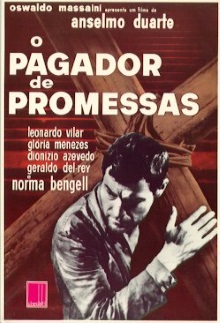
This is a rare example of a film which was independently added to our joint watch list both by myself and by my wife from different sources. It took a while for me to realize this as its English title sometimes appears as Keeper of Promises and sometimes as The Given Word. You could take this as a sign that it’s an exceptionally good film and you wouldn’t be wrong even though I’ve never heard of its director Anselmo Duarte before this.
Rural farmer Zé, accompanied only by his wife Rosa, carries a heavy wooden cross on his shoulder into the city. When questioned, he explains that he is doing it to fulfill a promise to Saint Bárbara: in exchange for healing his best friend, he will carry the cross all the way from his home to her church on her saint day and share his lands with the poor. At the first the priest who runs the church, Olavo, is impressed and sympathetic but later is astounded to learn that this best friend is actually a donkey and that the promise was actually made in the name of a pagan deity. He explains that the confusion between this pagan worship and the saint stems from the time that slavery was common but the simple Zé doesn’t understand the difference. Denied entry, he is forced to wait outside the church, gaining the attention of a newspaper reporter who links his cause to agrarian reform in Brazil. Black Brazilians descended from slaves flock to support him. Rosa is seduced by a pimp who turns out to be connected to the country’s internal security services. Even the owner of the cafe across the street has an interest as the gathering crowd vastly increases his business.
Whenever I classify the films that we’re scheduled to watch for the week, I sort of rate them according to how difficult I expect it would be to watch each one. Cartoons for example are usually easy and pleasant. Action movies are similarly unchallenging. I do this because it can be too mentally taxing to watch difficult films a few days in a row. A Brazilian film made more than fifty years ago by an unknown should put this in the difficult category so I was very surprised by how immediately engrossing and wonderfully entertaining this was. The plot is dead simple. It’s literally just one guy who shows up at the doorsteps of a church with his cross and waits for night and a day to be let in. Yet this one incident is used to illustrate so many of the issues in Brazilian society. As my wife states, this is just pure genius.
We have the Candomblé worshippers who are angry at being shut out by the Catholic church authorities as they believe that their pagan worship is compatible with that of the church while the church insists that they must forswear all paganism to be accepted. The leaders of the church are fully aware of how this is a disaster for their public image and yet feel obliged to defend the prestige of the church. The press sees this as a wonderful opportunity to sell newspapers and pay money for Zé to tour around the city to talk about his conviction. The secret police accuse him of being a Communist and of fomenting dissent against the government. The whole thing is both a farce and an impromptu carnival as people share food in the streets, dance, play music and perform the Capoeira. It’s a wonderfully rich portrait of a cross-section of Brazilian society laid out in a single succinct film.
In the middle of it all, the guileless and straightforward Zé is both confused and frustrated, making this a tragicomedy of epic proportions. I especially liked how all of the different parties are simply acting in their own best interests and it’s not as if they seriously suspect Zé of being duplicitous. It’s just that the Catholic church is forced to deny him entry to uphold orthodox liturgy while the government authorities are forced to take him seriously once his case has been picked up by the press. Even the Candomblé worshippers, sympathetic as they are, must think he is a fool. They ask him to take the cross to a pagan shrine instead since their own belief is that it’s the same deity as Saint Bárbara but he feels that he must decline because his promise was made to the saint. Only the motive of the pimp is hard to fathom though it may just be that he is the polar opposite to Zé in personality as he simply feels the need to take him down a peg.
I understand that this was adapted from a famous stage play so a lot of the credit must accrue to the playwright. But Duarte still deserves plenty of kudos for making a fine film that is also entertaining and easily accessible. It’s a wonder that this film isn’t more well known than it is and I strongly recommend it to everyone.